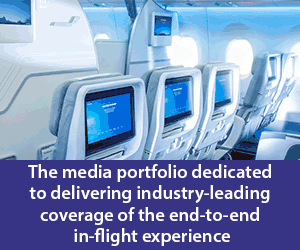Inflight editor Alexander Preston summarises the latest happenings across IFEC and cabin technology.
The eco credentials of some of the most vociferous climate change campaigners have recently been questioned, with the likes of David Beckham, Emma Watson and Emma Thompson all being called out for their use of first class seats and the frequency of their flights.
Hypocrisy? They could always try flying with a growing band of airline carriers driving initiatives to be more committed to zero-waste and plastic-free operations.
A few days ago, Qantas made the first-ever commercial flight to produce no landfill waste. All in-flight products onboard QF739, flying from Sydney to Adelaide and staffed by cabin crew from the Qantas ‘Green Team’, were disposed of via compost, reuse or recycling.
According to Qantas Domestic CEO Andrew David this flight would typically produce 34 kg of waste – with the Sydney to Adelaide route producing 150 tonnes of waste annually.
“This flight is about testing our products, refining the waste process and getting feedback from our customers,” he said.
About 1,000 single-use plastic items were substituted with sustainable alternatives or removed altogether from the flight, including individually packaged servings of milk and Vegemite. Alternative products used during the flight include meal containers made from sugar cane and cutlery made from crop starch, all of which is fully compostable.
At the end of the meal service, Qantas cabin crew collected the items left over for reuse, recycling or composting in multiple waste streams.
Customers used digital boarding passes and electronic bag tags where possible, with staff on hand to make sure any paper passes and tags were disposed of sustainably.
In the run-up to Earth Day (22 April), Etihad became the first airline in the Middle East to operate a flight without any single-use plastics onboard.
Buzz, Etihad’s current supplier of amenity products, collaborated with the airline to provide sustainable amenity kits, eco-plush toys and award-winning eco-thread blankets. Buzz pioneered and produced the blankets out of recycled plastic bottles.
Etihad identified over 95 single-use plastic products used across aircraft cabins, most of which were replaced with eco-friendly alternatives including cups, cutlery, dishes, headset bags, cart seals and toothbrushes. Once removed from this flight, Etihad prevented over 50 kg of plastics from being landfilled. Where suitable replacements could not be sourced, these items were not loaded. As a result of planning the Earth Day flight, Etihad additionally committed to remove up to 20% of the single-use plastic items onboard by 1 June 2019.
But it was Portuguese wet-lease carrier Hi Fly that led this year’s initiatives, with a series of single-use-plastic-free flights over the Christmas and New Year holiday period.
Hi Fly replaced plastic cutlery with bamboo alternatives and cups, salt and pepper shakers, packaging for bedding, dishes, individual butter pots, soft drink bottles and toothbrushes were switched with compostable alternatives crafted from recycled materials on a series of full-passenger test flights to and from Brazil.
The eco-alternatives used were plant-based catering disposables made from renewable, lower carbon or recycled materials that can be composted along with food waste.
After the flights, excess food waste and packaging were collected and delivered to a licensed waste management operator where they were processed for energy production.
Bamboo cutlery was sanitised by Hi Fly’s catering arm LSKY to be reused. Glass bottles were returned to the supplier to be cleaned and re-filled, while card and paper were grouped for collection and recycling. The total weight of plastic saved across the whole trial was 1,500 kg.
As one passenger said: “Plastic pollution needs to be addressed. My daughter will be delighted to hear that I was on the first ever flight in the world to take off without plastic.”
So now you don’t have to be star of the silver screen to be an environmental star.
The editor’s comment is published weekly as an accompaniment to the Inflight e-newsletter. If you do not currently receive our email updates, you can subscribe here.






